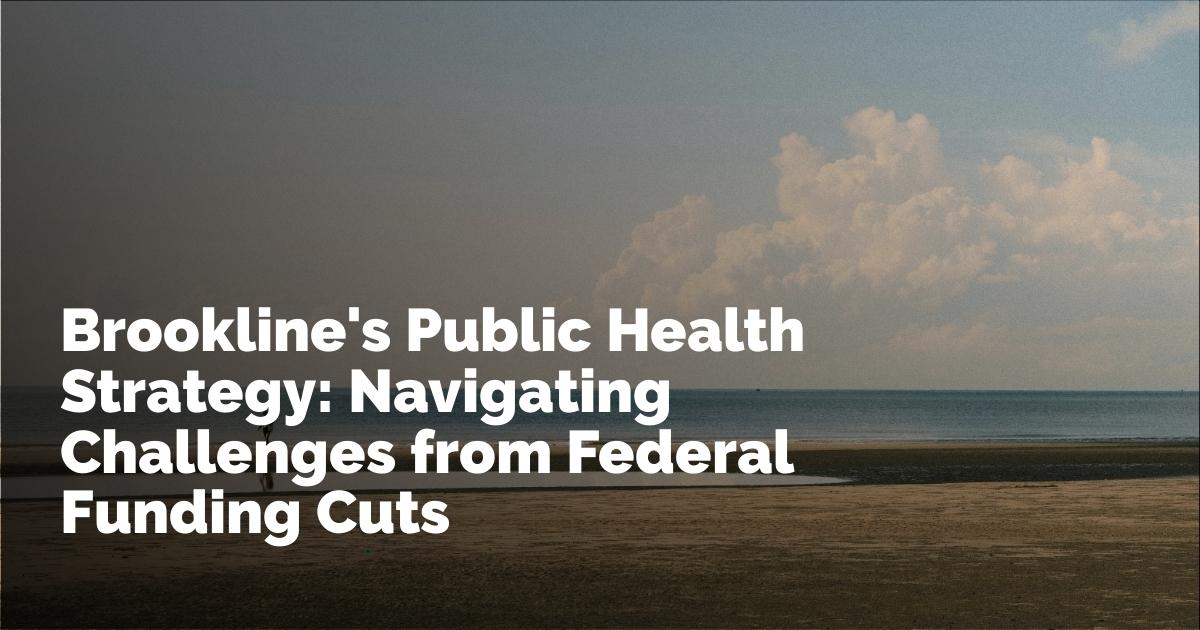Brookline's Response to Federal Public Health Funding Cuts
Brookline, a vibrant town in Massachusetts, is currently facing significant challenges due to cuts in federal funding for public health programs. Local officials and organizations are stepping up to ensure the wellbeing of their community amidst these changes. This article explores the strategies being implemented to sustain and enhance public health efforts in Brookline during a period of heightened uncertainty.
The Impact of Federal Funding Cuts
The Trump administration's decision to terminate $11 billion in public health grants has sent shockwaves through communities across the United States. Although a federal judge has temporarily blocked these cuts, the uncertainty surrounding future funding remains a critical concern. In Massachusetts alone, the potential loss amounts to $100 million over the next year, as reported by Governor Maura Healey's office.
Broader Implications for Brookline
While direct job losses within Brookline's public health services might not be imminent, the ripple effects of these funding cuts could significantly impact state grants and the support provided to local nonprofit partners. Activities that have been integral to public health progress may be curtailed, forcing local health officials to reevaluate their priorities and focus on essential services. Sigalle Reiss, Director of Brookline's Public Health Department, emphasized this shift, noting the need to possibly return to basic yet critical functions while toning down more pioneering public health projects.
Community Advocacy and Support
Amid these challenges, Brookline proposes an increased focus on local support. This shift underscores the importance of community-driven initiatives and grassroots efforts in maintaining public health services. Patricia Maher, President of the Friends of Brookline Public Health, highlighted the necessity of nurturing a caring community spirit as a resilient response to federal funding limitations. Her organization's recent fundraising efforts gathered nearly $3,812, directed toward essential programs, such as school health services and food pantry support. Maher asserted, "Caring is a form of power."
Celebrating Public Health Achievers
The emphasis on community engagement and resilience is further exemplified by recognizing notable contributors to public health during the recent “High Stakes for Public Health in 2025” event. This event marked National Public Health Week and was a platform to honor those making significant strides in the field.
Keynote Awardees
Chris Chanyasulkit, former President of the American Public Health Association, was honored with the Alan Balsam Public Health Leadership Award for her dedication, including founding the Diversity, Equity, Inclusion, and Community Relations office within the Brookline Public Health Department. Chanyasulkit’s leadership and vision have played instrumental roles in advancing public health equity in Brookline.
Additionally, Deborah Brown, President of the Brookline Community Development Corporation, received the inaugural Public Health Equity award for her work in promoting housing stability and supporting the Brookline Food Pantry. Her advocacy underscores the intrinsic link between health and social justice, reinforcing the notion that "equity is not a dirty word."
Innovative Partnerships
Recognition also extended to local fitness and yoga establishments, including Healthworks Fitness and Down Under School of Yoga, which received the Herb Carlin Community Health Award for their contributions to promoting healthier lifestyles within the community.
Navigating Federal Cuts with Strategic Planning
An essential part of the evening's discussion revolved around the strategies to navigate impending federal cuts. Nicole Huberfeld, a health law professor from Boston University, elaborated on the importance of prioritizing cost-efficient public health initiatives without compromising the quality and accessibility of services. The goal is not merely to reduce expenses but to maximize the return on every dollar spent on public health.
A Holistic Community Health Improvement Plan
Brookline's new Community Health Improvement Plan (CHIP) is at the forefront of these efforts, focusing on four key priorities to improve local health outcomes: financial security, access to social and health services, affordable housing, and mental and behavioral health. John Kleschinsky, Assistant Director of Policy and Programming, shared how the CHIP will facilitate residents in securing financially stable jobs and accessing vital health services.
The Importance of Equity
Health equity remains a central tenet of these strategies, as pointed out by Reiss, who stated, "We want to make sure that resources and opportunities are distributed fairly and that historically underserved communities receive the support they need." This equitable approach is crucial for addressing disparities and ensuring comprehensive community health advancement.
Collaboration with Nonprofits
Brookline also recognizes the pivotal role of partnering with nonprofits, as highlighted by Brita Lundberg, founder of Lundberg Health Advocates. Collaboration between various entities ensures that public health efforts are coherent and effective rather than operating in silos. The community benefits from unified approaches to overcoming challenges.
Setting a Precedent for Local Action
The Brookline event underscored a proactive stance on federal cuts by establishing a structured plan with actionable strategies, well before the funding reductions occurred. This preparedness exemplifies how local initiatives can spearhead changes that safeguard community health despite external adversities.
Moving Forward
As Brookline navigates these uncertain times, its commitment to public health remains strong, driven by local action, community engagement, and partnerships. The town is determined to maintain its public health standards through concerted efforts while adapting to the challenging landscape shaped by federal policies. Through strategic planning and collaborative efforts, Brookline continues to exemplify resilience and innovation in public health.
출처 : Original Source

